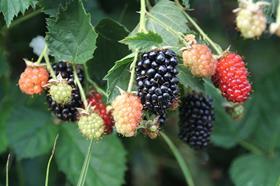
Soft fruit producers will soon have a new generation of blackberry varieties at their disposal that will enable them to significantly extend their production season and offer greater continuity of supply to consumers.
Ekland Marketing Company of California has been conducting trials of new blackberry varieties and advanced selections developed by the University of Arkansas (UA) variety development programme since 2012. Several of these have reached commercial production and will be on supermarket shelves within the coming season.
According to president Roy Ekland, the UA programme takes the production and marketing of blackberries in an exciting new direction.
“The UA’s plant breeder, Dr John Clark, developed the first primocane fruiting blackberry varieties. These have the potential to extend the production and marketing of quality blackberry fruit well beyond the traditional summer window,” he explained. “Growers are already familiar with primocane raspberry varieties and the blackberry counterparts perform in a similar manner.”
By using different pruning strategies, growers in the Mediterranean region can bring primocane blackberry cultivars into production in the spring. Varying the pruning regimen enables the same varieties to produce a late summer and early fall crop. Ekland says trials are currently under way to determine if plants that fruit in the spring can be pruned to produce a second crop in the fall, increasing the yield potential of the blackberry plantation.
“In low latitude production areas such as Central America, the primocane blackberry varieties produce continuously over a 12-month period,” he said. “Other growers use different pruning strategies to bring the plants into fruit production during specific market windows.”
In the higher latitude countries in western and central Europe, the primocane blackberry varieties offer the potential to produce a late summer/early fall crop of quality fruit.
The company’s trial collaborator and licensee in the Ukraine, Adana-3, has already shown the viability of producing and marketing quality fruit from mid-August to late September. The company is currently trialling an advanced selection that brings forward the date of first harvest to early August.
Extending the local production season complements the existing import of blackberries from production areas outside of the EU. “From our experience, increasing the presence in the market of reasonably priced, quality fruit builds the consumers’ familiarity with blackberries and expands the consumption of the fruit,” Ekland said.
Research shows that by displaying different types of berries together at the point of sale, marketers create an attractive ‘berry basket’ that captures the attention of consumers.
“Wherever used, this approach has increased sales of all berries, benefiting consumers, marketers and fruit producers. That is why we are confident that the UA’s primocane blackberry cultivars will make an important contribution to expanding the consumption of blackberry and other small fruits,” he concluded.



